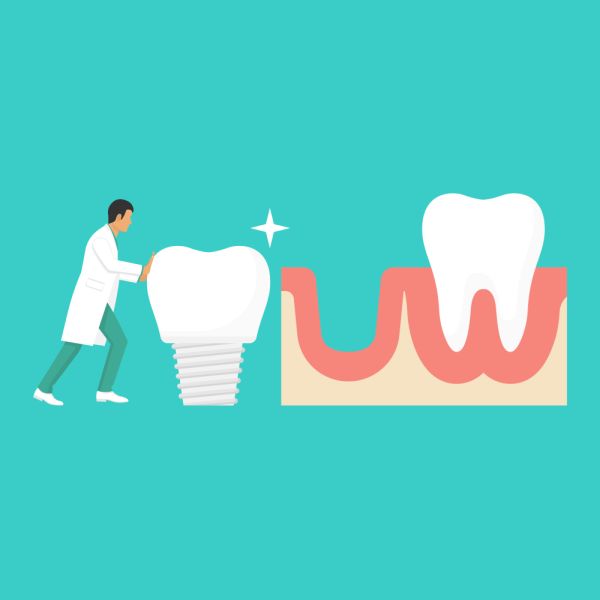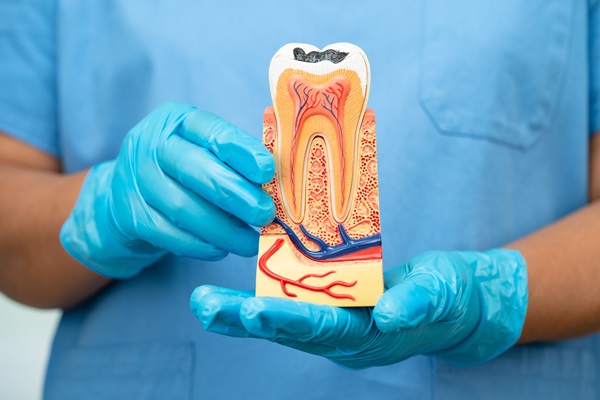Implant Supported Dentures: A Permanent Solution for Missing Teeth

If you have lost most or all of your teeth to decay and other injuries, consider looking into implant supported dentures. Like real dentures, these models provide a replacement for missing teeth. However, the implants in implant supported dentures are fused to the jawbone, allowing for much more support for the replacement teeth.
Types of implant supported dentures
There are two different types of implant supported dentures: bar-retained and ball-retained. Both have similar end results but connect the implants to the dentures in different ways. Patients can discuss the differences further with a dental professional to see which one is preferred.
Bar-retained dentures
Bar-retained dentures feature a metal strip that follows along the base of the jaw and is attached to implants that have already been sealed to the jawbone. Clips are used to facilitate the easy removal and reattachment of bar and denture.
Ball-retained dentures
On ball-retained dentures, a metal attachment extends from each implant and fits into a reciprocal attachment on the denture, similar to an electrical outlet and a plug. In most applications, the attachments on the implants are ball-shaped — hence the name — and fit perfectly into the holes on the base of the denture.
What to expect
In most cases, implant supported dentures can take anywhere from four to six months to fully install. If the patient already uses a set of dentures, it could take less time.
Initial steps
The first step is for the patient to schedule a consultation with what is known as a prosthodontist. These dentists focus on the creation and maintenance of artificial teeth.
During this initial consultation, the prosthodontist or another dental professional reviews the patient’s medical and dental histories and goes over surgical options and preferences. In addition, X-rays are taken of the patient’s mouth structures and models made of teeth and gums for the purpose of constructing the dentures. The results of these tests also inform the surgeon as to the optimal placements for implants and if they will potentially affect sinuses or nerves.
First surgery
Once the dentist has a model of teeth and gums, surgeries are scheduled to take place sometime in the following weeks. During the first surgery, the surgeon makes an incision into the gums over where each implant is to be placed. The surgeon then drills a hole into each incision all the way down to the jawbone. Finally, the implants are placed in each hole and secured.
Second surgery and final procedure
After a couple of months, the mouth should be fully recovered and the second phase of surgery can commence. At this stage, the surgeon places caps over each implant to help the gums heal properly. Once another few weeks pass to give the patient enough rest, the caps are replaced with permanent abutments. Finally, the dentures are crafted and given to the patient.
Conclusion
Traditional dentures can be a pain to maintain and use, but luckily there are alternatives. For those who have lost their teeth in old age, implant supported dentures can restore a beautiful smile.
Are you considering implant supported dentures in the Gibbsboro area? Get more information at https://beautifulmouth.com.
Check out what others are saying about our services on Yelp: Read our Yelp reviews.
Recent Posts
Dental implants are the best way to fill in the gaps from missing teeth. Missing teeth cause a number of oral health issues, including making it harder to chew and altering the structure of the other teeth. However, dental implants are not suitable for all patients. You must have healthy teeth and gums, good oral…
Dental implants are one of the options you get to choose from if you are missing one or more teeth. A growing number of people are opting for implants thanks to the convenience that comes with them and their bone tissue preserving properties. Dental implants are rods/screws that are inserted into the jawbone to serve…
Dental implants are easy to care for at home and with regular visits with your general dentist. You can ensure your dental implants last for as long as possible by understanding useful tips for caring for your new teeth and periodontal health at home through good oral care and smart dietary and lifestyle choices. Dental implants…
Dental Implants are artificial tooth roots that an implant dentist places in the jawbone so it can bond with the natural bone. This screw-shaped implant acts as a strong foundation to reinforce a replacement tooth. Modern dental implants have been used for over 30 years and are a great solution for missing teeth. Dental implants…


